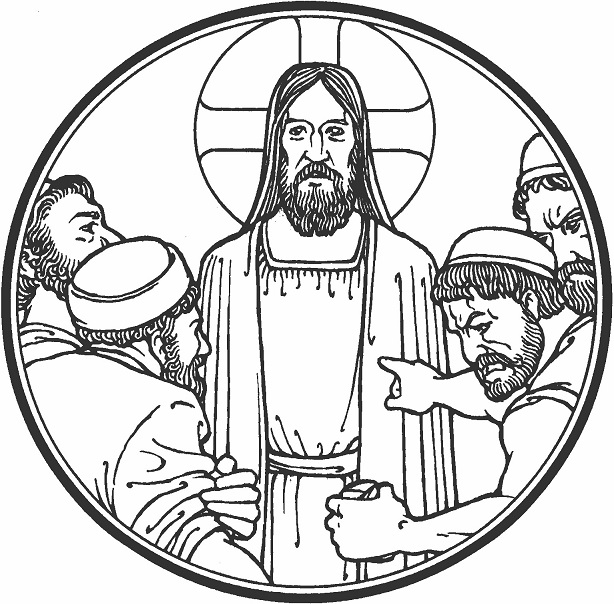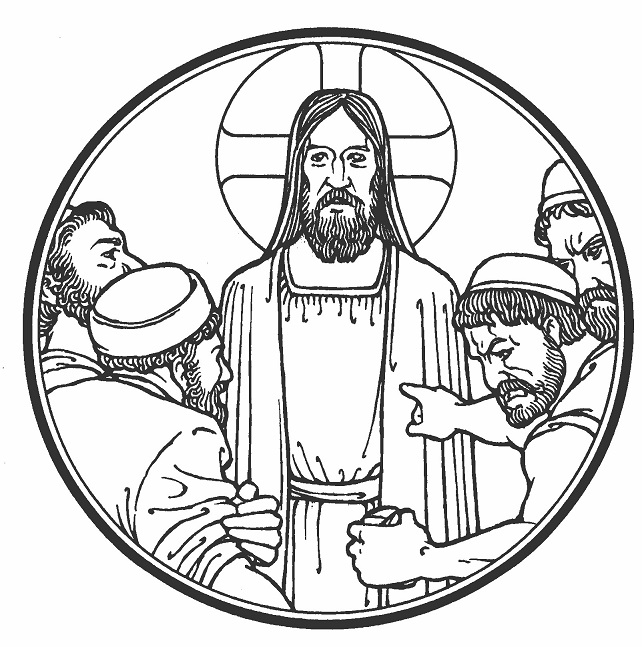Holy Baptism of Mathilda Goehring
Readings: Genesis 22:1-14 | Hebrews 9:11-15 | John 8:46-59
Text: Genesis 22:1-14
“God, what in the world are You doing? I can’t handle this! I just got done with the last wrench You threw in the works!” There are times like this, where honestly, we have no idea what our God is at work doing—only that it’s hard and we can’t see how it’s going to work out. But in these times, He doesn’t tell us what He’s thinking, except the familiar words of Jeremiah 29:11: “I know the plans I have for you, declares the Lord, plans for welfare and not for evil, to give you a future and a hope.”

Yet, there is a time where we are given a glimpse into the Lord’s thoughts. That is the passion of God’s Son, Jesus Christ. There, God tells us so much of Himself, that the Father speaks directly from heaven three times: at Jesus’ Baptism, at the Transfiguration, and in John 12 when Jesus prays, “’Father, glorify your name.’ Then a voice came from heaven: ‘I have glorified it, and I will glorify it again.’”[1]
But when it comes to the Passion of Christ, perhaps we’ve heard it so many times and seen different depictions, that its full weight doesn’t always hit us. That’s why we turn to Abraham, so that we can learn what cost and pain God bore to gain our salvation. The testing of Abraham puts flesh on the Father’s offering, in terms that we can appreciate and feel ourselves.
“For God so loved the world, that He gave His only-begotten Son…”[2]
Abraham had waited for his son Isaac. In fact, he had waited an entire lifetime; Isaac was born to him at one hundred years old. Isaac was quite possibly the most special child ever given in answer to prayer. He meant everything to Abraham, and he was the fulfillment of God’s promised mercy. His very name, which meant ‘laughter’ was a constant reminder of how exceedingly overjoyed Abraham and Sarah had been at his birth, and God’s supreme faithfulness.
But then God gives the command: “Take your son, your only son Isaac, whom you love, and go to the land of Moriah, and offer him there as a burnt offering on one of the mountains of which I shall tell you.” Is this some kind of perverse humor on the part of God? This sounds more like something out of pagan mythology. The thought must have crossed Abraham’s mind, “God, what are you thinking?” God demands the life of Abraham’s promised son. This is the same son God had said, “The son of your own loins will be your heir.”[3] And Abraham believed God and “saddled his donkey” with Isaac.

Abraham did not know the outcome of this. On the way, Isaac noticed that something wasn’t right about their sacrifice, “Behold, the fire and the wood, but where is the lamb for a burnt offering?” Abraham knew, but didn’t want it to be true. Yet, he knew that this is how it must be. His God of promise had given the command. So, prophesied unknowingly to Isaac, “God will provide for himself the lamb for a burnt offering, my son.”
St. Paul would later call Abraham the “man of faith”[4] because he obeyed God’s Word even though it meant terrible loss to himself. God had given Him Isaac and now it seemed the Lord would once again take away. “9 When they came to the place of which God had told him, Abraham built the altar there and laid the wood in order and bound Isaac his son and laid him on the altar, on top of the wood. 10 Then Abraham reached out his hand and took the knife to slaughter his son.” Abraham remained completely faithful to God’s command, “not turning to the left hand or to the right.”[5] His upraised hand held the knife that would put his own son to death. It wasn’t like Job, who lost his family to natural disaster. It wasn’t even like Adam who lost one son to the evil of his firstborn.[6] No, Abraham had to do the slaying because God had commanded it.
“11But the angel of the Lord called to him from heaven and said, “Abraham, Abraham!” And he said, “Here I am.” 12 He said, “Do not lay your hand on the boy or do anything to him, for now I know that you fear God, seeing you have not withheld your son, your only son, from me.” 13 And Abraham lifted up his eyes and looked, and behold, behind him was a ram, caught in a thicket by his horns. And Abraham went and took the ram and offered it up as a burnt offering instead of his son.”
Abraham’s faith in God was justified because he offered up his son, his only son. But God did not take Isaac’s life. The Lord provided a substitute for the life of Abraham’s son: a male lamb for a burnt offering. And that is how it continued for Israel all their days under the Law of Moses—the lives of bulls, sheep, goats, and birds for the life of the Israelites.[7]

Years later, God’s people, Israel, would live near people who were so perverse they did offer their sons to get an answer from heaven. The worship of the god Molech, involved sacrificing your children, burning them alive to garner the god’s favor. At that, we ought to wretch. So desperate is our desire to have some control over what happens to us.
The last plague of Egypt was something unthinkable: “every firstborn in the land of Egypt shall die, from the firstborn of Pharaoh who sits on his throne, even to the firstborn of the slave girl who is behind the handmill.” (Exodus 11:5) God would put to death the firstborn of every Egyptian. Why be so inhumane, we might ask the Lord?
God was not beyond showing that sin is so serious that it deserves the death of the firstborn son. But just as He did for Isaac on Mount Moriah, He did for the Israelites:
11 “When the Lord brings you into the land of the Canaanites, as he swore to you and your fathers, and shall give it to you, 12 you shall set apart to the Lord all that first opens the womb…Every firstborn of man among your sons you shall redeem. (Exodus 13:11-13)
Sin’s deadly poison infects even the youngest child. But just as with Isaac, God provides a substitute, a redeemer. He does not ask for the life of you or your child. Even though sin is very serious, deadly even. Instead, He provides a Lamb for the sacrifice.
"God…gave His only-begotten Son, that whoever believes in Him should not perish.”
God provided for Himself the Lamb, and because of Him, your life is saved. God gave up His Son into death so that you are His child and call on Him as Father. And He tells you no lie: You are truly His children because He adopted you in the waters of Baptism. From Galatians 3, “You are all sons of God, through faith, for as many of you as were baptized into Christ have put on Christ…And if you are Christ’s, then you are Abraham’s offspring, heirs according to promise.”[8]
That has made Mathilda an heir of that promise. God has not demanded her life, but provided for her a Lamb, who has died in her place. Simon and Corinne brought her to these saving waters because they believe in the Lord, who says through St. Paul, “Do you not know that all of us who have been baptized into Christ Jesus were baptized into his death? We were buried therefore with him by baptism into death, in order that, just as Christ was raised from the dead by the glory of the Father, we too might walk in newness of life. For if we have been united with him in a death like his, we shall certainly be united with him in a resurrection like his.” (Rom. 6:3-5)

This is why we treasure Baptism so much and call it holy. It is God’s salvation delivered. The substitute Abraham believed the Lord would provide, nailed to the cross of Calvary, so that everyone who clings to Him in faith shall not perish, but have everlasting life. Mathilda may not be able to display and articulate her faith today, but she has received an eternal gift. And it is now your duty, Simon and Corrine, to teach her about that gift she has from God as she grows, so that she would live all her days as an heir of eternal life.
And should any Christian ever doubt God’s love for them, look back and see what price He paid for your salvation. The Father suffered His only-begotten Son to be betrayed, mocked, flogged, crucified, dead, and buried. Faith will tell you all of this was for you, so that you would be His child. St. John tells us, “See what kind of love the Father has given to us, that we should be called children of God, and so we are.”[9]
In the Name + of Jesus. Amen.

[1] John 12:28
[2] John 3:16
[3] Genesis 15:4
[4] Galatians 3:9
[5] Deuteronomy 5:34
[6] Job 1:18-19; Genesis 4:8
[7] Leviticus 1:1-17
[8] Galatians 3:26-27
[9] 1 John 3:1








